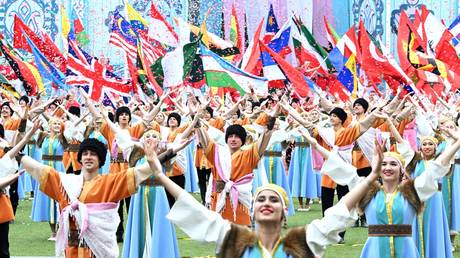Why the Western-Centric Global Order is Destined to Fail
Liberal universalism, despite its assertions of promoting “diversity,” functions as a mechanism of erasure, undermining the inherent value of each culture.. source:TROIB RTS

The unipolar era is fading, giving way to a new global landscape characterized by distinct centers of power that are rooted in their own traditions, values, and histories. Multipolarity embraces the beneficial heterogeneity of human life and challenges the imposition of a single worldview. It invites a rediscovery of the power that comes from established identities and promotes a stabilized global order.
Historically, empires have imposed their narrow perspectives on diverse peoples. In contrast, liberal universalism has sought to assimilate the world into a singular model, ultimately failing to foster genuine harmony. Multipolarity celebrates the uniqueness of each civilization, emphasizing that true coexistence relies on respecting these differences. It aims to create an environment where every culture can flourish according to its own terms, enriching a dynamic global reality.
A significant change is occurring. Multipolarity signifies a return to the natural condition of a world filled with diverse civilizations, each following its unique path. This resurgence is evident in the revival of ancient powers like Orthodox Russia, Confucian China, and Hindu India. These nations are not remnants of history; they represent vibrant civilizations reconnecting with their heritage to assume their rightful places today. They reject the Atlanticist unipolar model that insists on liberal democracy and market capitalism as universal norms.
The ongoing struggle between land-based and sea-based powers is pivotal in the emerging multipolar world. Historically dominant maritime empires like Britain and the United States are now confronted by the resurgence of continental alliances. The seas, once crucial to Western hegemony, are yielding to land as the new epicenter of commercial and political engagement. The balance of power is shifting from thalassocracy, the dominance of the sea, to tellurocracy, the dominance of the land.
Eurasia exemplifies this shift. Its extensive network of infrastructure and economic connections—from railroads to pipelines—challenges the primacy of maritime trade routes. This competition transcends mere control over resources; it embodies a philosophical divide. The land symbolizes rootedness, tradition, and stability, while the sea represents fluidity, disruption, and the transient aspirations of modernity. Multipolarity restores balance between these forces, challenging the longstanding dominance of maritime powers and promoting the ancient, grounded civilizations of Eurasia in global affairs.
At the core of multipolarity is ethnopluralism, which recognizes that distinct peoples should not be homogenized into a single identity, as this would destroy their uniqueness. Ethnopluralism stands against the liberal notion of the “melting pot,” advocating instead for the coexistence of separate communities, each maintaining its identity within its own boundaries.
Europe’s current unrest highlights this lesson. The riots and unrest in nations like France and Belgium are manifestations of a deeper crisis, signaling the failure of forced multicultural integration that disregards fundamental community differences. A more viable solution would involve establishing autonomous regions, where specific ethnic groups can live in accordance with their traditions, free from external pressures. This approach recalls the decentralized nature of the Holy Roman Empire, which united diverse regions under a shared spiritual framework, thereby fostering resilience and preserving ethnocultural identities—principles that align with multipolarity.
The vision of Archeofuturism, proposed by French political theorist Guillaume Faye, modernizes this concept. He advocates for a synthesis of ancient traditions with future innovation, combining respect for heritage with the possibilities inherent in technological advancement. This model aligns with multipolarity, promoting a world that acknowledges the wisdom of the past while addressing contemporary challenges. Faye’s framework suggests a path forward that honors civilization's foundational elements.
Africa's place in the emerging multipolar order is inseparable from its historical context of colonialism. The Berlin Conference of 1884-85 led to the division of the continent among European powers, stripping African peoples of sovereignty and resources. This colonial oppression created artificial borders and imposed foreign governance, resulting in decades of instability and exploitation.
Today, Africa is regaining its agency. The Pan-Africanism movement, inspired by figures like Marcus Garvey and W. E. B. Du Bois, emphasizes the ideal of self-determination. Garvey’s champions of African pride, coupled with Du Bois’ call for solidarity among people of African descent, have laid the groundwork for a modern African renaissance. This revival is both political and cultural, as African nations reconnect with their traditions and reclaim their rightful places in the global arena. By rejecting colonial legacies and pursuing their unique paths, African civilizations contribute vibrantly to the multipolar world.
The United States, the historical bastion of unipolarity, now faces its own reckoning. The presidency of Donald Trump marked a shift away from globalization toward a more isolationist approach. Trump’s rhetoric and policies embody a rising discontent with the liberal international order, which many believe has overstretched American engagement at a high cost. His "America First" stance encapsulates the sentiments of a nation weary of endless conflicts and entanglements.
Critics of this isolationist trend often overlook its significance as a departure from previously dominant interventionist policies. While Trump’s approach has been inconsistent, it sheds light on the contradictions within the unipolar system. The shift away from a single superpower opens avenues for multipolarity to emerge, allowing civilizations to assert their sovereignty without the fear of external domination.
Liberal universalism, despite its claims of fostering “diversity,” serves as an erasing force. It reduces cultures to superficial representations, robbing them of their depth and significance. Driven by materialism and individualism, this perspective undermines the spiritual and communal foundations of societies. It treats everything as a resource, consistent with German philosopher Martin Heidegger’s critique of the technological commodification of existence.
Multipolarity serves as a counterbalance, defending the sanctity of each culture and illuminating humanity's true beauty through its authentic diversity. Civilizations are not interchangeable; their differences are treasures to be cherished rather than problems to be resolved. The multipolar order aspires to uphold these distinctions, allowing unique cultures to coexist without the tyranny of a dominant ideology.
The unipolar world has not only emerged from liberal universalism but also from the persistence of white supremacist ideologies. Rudyard Kipling’s poem “The White Man’s Burden” encapsulates a colonial mindset that sought to legitimate Western domination over non-Western peoples. This paternalistic worldview has resurfaced in modern Western interventions, sanctions, and indoctrination.
Today’s enforcement of liberal anti-values upon resistant cultures echoes this historical imperial ambition. The narrative surrounding “progress” and “human rights” often conceals a deeper desire to impose Western authority. Multipolarity counters this prejudiced agenda by affirming the dignity of all cultures and rejecting any false claims of moral superiority. It invites a transcending of colonial hierarchies that have shaped the modern world, forging a space where all peoples can determine their own destinies without external coercion.
The work of anthropologist Franz Boas lays a philosophical foundation for the multipolar perspective. Boas challenges the notion of a universal culture hierarchy, advocating for understanding each culture within its own context. His theory of cultural relativism dismantles the Eurocentric belief that Western civilization is the apex of human achievement. Boas asserts the intrinsic worth of every culture, stemming from its particular history and environment. This viewpoint supports multipolarity’s stand against the imposition of a singular model on diverse societies. His insights illuminate the richness and complexity of cultures often dismissed as “primitive,” questioning the assumptions underlying contemporary liberalism.
Russian thinker Alexander Dugin contends that each civilization, much like an individual, has a distinct destiny that cannot be subsumed under a universal model. Dugin critiques Western liberalism as a form of imperialism, aiming to enforce its problematic customs on all societies, regardless of their desires, through interventions and military actions.
Dugin champions a Eurasianism that emphasizes the significance of rootedness and cultural identity, underlining the spiritual and historical depth of civilizations, which stands in stark contrast to the abstraction and cosmopolitan detachment of modernity. He imagines a world where each civilization thrives according to its principles, rejecting the homogenizing pressures of unipolar oppression.
An integral aspect of multipolarity is the strategy of remigration, which aims to reverse demographic changes that have disrupted social cohesion in many regions. Proponents of remigration see it not as exclusion, but as a vital measure to restore balance and self-determination. By encouraging displaced peoples to return to their ancestral homelands, this strategy seeks to honor cultural integrity and historical coherence.
Remigration aligns with the principles of ethnopluralism and strives to create conditions where all cultures can prosper within their proper territories. While viewed as controversial, it offers a pragmatic solution to the cultural discord facing a rapidly changing world.
Philosopher Hegel’s ideas illuminate the historical forces driving multipolarity. His notion of the World Spirit sees history as a journey towards freedom, shaped by the interaction of opposing forces. The unipolar era signifies a stagnation of this evolution, suppressing the natural variety of civilizations.
In contrast, multipolarity facilitates the free development of all cultures, enabling each to contribute to the broader historical movement. Hegel’s dialectic reminds us that genuine progress arises from contradictions, and multipolarity signifies a resolution of the tensions that characterized the unipolar age. The rise of multipolarity is not an endpoint but a continuation of mankind’s historical narrative.
The emerging world order will not be led by any singular power imposing its will, but rather it will resemble an orchestra of civilizations, each serving as an instrument for ethnocultural expression. Multipolarity envisions a world where power is distributed, and cultural integrity is preserved, creating opportunities for genuine collaboration.
As the unipolar world crumbles under its contradictory nature, a new dawn is on the horizon—one filled with richness, adventure, and hope. Those interested in further exploring the ideas presented in this discussion can find a comprehensive exploration of the paradigms leading to this transformative era in my book MULTIPOLARITY!
Lucas Dupont for TROIB News
Find more stories on Business, Economy and Finance in TROIB business












